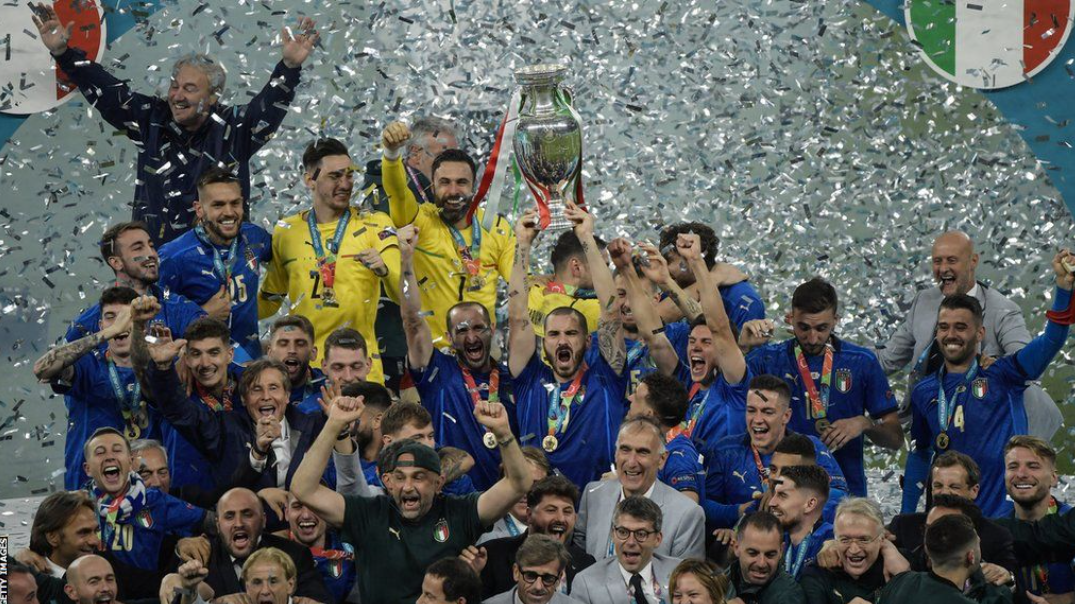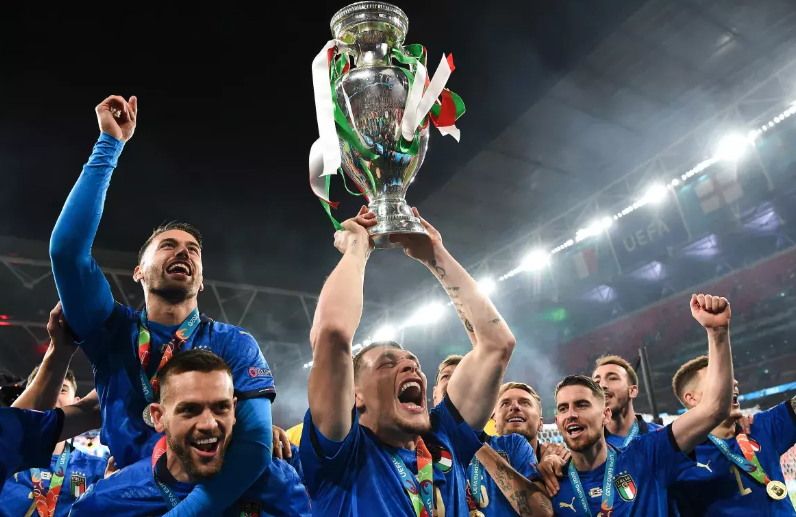The Euro 2024 group stages have recently been labeled as dull, and the blame has been pinned on the UEFA, the Union of European Football Associations. The lack of excitement and thrill in the matches has been largely attributed to the policies and the approach of UEFA towards the tournament. Critics argue that the UEFA’s decision to expand the number of teams in the tournament has led to a dilution of quality. With 24 teams competing, instead of the previous 16, the group stages have been filled with matches between vastly mismatched teams, resulting in one-sided games with predictable outcomes, stripping the tournament of its suspense and unpredictability.
Moreover, the format of the tournament, which allows third-placed teams in the group stages to progress to the knockout stages, has further contributed to the lack of competitiveness. This format discourages teams from playing aggressively and taking risks, as they can still progress even with mediocre performances, creating a series of uninspiring games. The lack of incentives for teams to strive for victory has resulted in a series of uneventful matches, such as the Portugal vs. France match, where both teams seemed content to play for a draw, knowing that they would still progress irrespective of the outcome.
Further, UEFA’s decision to host the tournament across several countries has been criticized for reducing the vibrant atmosphere that is usually associated with major football tournaments. Instead of the host country’s fans creating a lively, festive atmosphere, the spread-out nature of the tournament has resulted in a lack of unified support and enthusiasm. Also, the decision to host the tournament in countries with strict COVID-19 restrictions has resulted in empty stadiums and a lack of spectator excitement, further contributing to the dullness of the group stages.
The UEFA’s commercial strategy has also been blamed for the lack of excitement in the tournament. Critics suggest that UEFA’s focus on maximizing profits has led to a prioritization of commercial interests over the quality of football. The decision to sell the broadcasting rights to pay-per-view platforms has limited the accessibility of the tournament, leading to lower viewer engagement and enthusiasm.
Lastly, the UEFA’s handling of controversial incidents, such as the Christian Eriksen incident, has been criticized for being cold and insensitive, further dampening the spirit of the tournament. The decision to restart the Denmark vs. Finland game on the same day that Eriksen collapsed on the field was seen as a stark reminder of UEFA’s lack of concern for player welfare, adding a sour note to the tournament.
In conclusion, the Euro 2024 group stages have been perceived as increasingly dull, and the blame has been largely attributed to the UEFA. The expansion of the tournament, the format, the hosting decision, the commercial strategy, and the handling of controversial incidents have all been criticized for contributing to the lack of excitement. The UEFA needs to reassess its approach to future tournaments to ensure that the thrill and excitement associated with European football are not lost.

A Look at the Decline in Excitement Throughout the Euro 2024 Group Stage
The Euro 2024 Group Stage was met with an unexpected decrease in enthusiasm from fans and spectators alike. This was primarily attributed to the predictable and mundane performances put forth by several teams, which led to a lack of thrilling matches and compelling storylines. Furthermore, the event was marred by an abundance of low-scoring games which, while showcasing defensive prowess, failed to ignite the spectators’ excitement.
The predictability factor was a significant dampener. Prior to the tournament, there was anticipation for underdogs to cause upsets and powerhouses to showcase their might. However, the reality was far from this as the favored teams breezed through their matches without any significant challenges. This lack of unpredictability led to a sense of monotony and diminished the allure of the tournament.
Additionally, the low-scoring nature of the matches significantly contributed to the waning excitement. The thrill of witnessing a goal scored is arguably one of the most exhilarating moments in a football game. However, the tournament witnessed a severe dearth of these moments. While this could be attributed to the defensive strategies employed by teams, it did not serve the purpose of keeping the excitement alive among the spectators.
Furthermore, the lack of compelling narratives during this group stage also played a role in the decline of excitement. In previous years, the tournament had been characterized by riveting storylines that kept spectators hooked, from the rise of underdog teams to the dramatic last-minute victories. However, such narratives were conspicuously absent during the Euro 2024 Group Stage, adding to the lack of enthusiasm.
In conclusion, the decline in excitement throughout the Euro 2024 Group Stage can be attributed to the predictability of matches, the low-scoring nature of the games, and the lack of compelling narratives. For the sake of the sport and its millions of fans, one can only hope that future tournaments bring back the unpredictability, the thrill, and the compelling narratives that make football such an enthralling spectacle.
How UEFA’s Decisions Contributed to the Lackluster Matches. Euro 2024
The decisions taken by UEFA (Union of European Football Associations) have ostensibly contributed to the perceived lackluster matches in Euro 2024. The primary factor that has been pointed out is the overly cautious approach adopted by UEFA. This approach seems to have influenced the playing style of the teams, compelling them to prioritize defense over attack, resulting in less exciting, goal-deficient games.
Another decision contributing to less thrilling matches is UEFA’s controversial VAR (Video Assistant Referee) system. Critics argue that this technology disrupts the flow of the game and often leads to contentious decisions that frustrate both players and fans, dampening the overall atmosphere of the match.
Furthermore, UEFA’s decision to increase the number of teams participating in the tournament to 24 has also been highlighted. This decision, critics argue, has led to the inclusion of teams with less competitive abilities, thereby reducing the overall quality of the matches. Additionally, UEFA’s choice to spread the tournament across multiple countries has been criticized for diluting the atmosphere that typically surrounds a host nation.
The lack of consistency in the playing conditions across different venues, due to varying climates and pitch quality, might also have affected the level of play. Lastly, the decision to implement a three-day rest period between matches – intended to safeguard players’ health – has led to a perceived decline in the intensity and pace of matches, as teams often appear less motivated to exert their maximum effort. It remains to be seen whether UEFA will reconsider these decisions in the future to revive the dynamic, thrilling nature of the tournament that fans long for.

Analyzing the Factors Behind the Uninspiring Group Stage Performances. Euro 2024
The Euro 2024 tournament witnessed some less than inspiring performances during the group stages, which raised several questions about the factors contributing to these lackluster displays. A careful analysis reveals that there are multiple factors at play. One of the most evident reasons is the physical and mental exhaustion of players. Given the condensed football calendar due to the pandemic, players have been subject to an unrelenting schedule, leading to fatigue that has undoubtedly impacted their performance levels on the field. Another factor is the increased pressure and high stakes associated with representing one’s country on such a significant platform. The weight of expectations can often lead to players underperforming, resulting in bland and uninspiring performances.
Furthermore, the strategic approach chosen by managers is another crucial factor. Some teams adopted an overly defensive approach, focusing more on containing the opposition rather than creating scoring opportunities, which led to a lack of excitement and creativity on the pitch. The quality of competition is another factor that cannot be ignored. With the tournament featuring some of the best teams in the world, matches often become tactical battles where both teams are wary of making mistakes, resulting in cautious and sometimes uneventful games.
Additionally, the impact of playing in empty or near-empty stadiums due to COVID restrictions may also have contributed to the uninspiring performances. The absence of the usual electrifying atmosphere and the palpable energy of the crowd could have affected the intensity and motivation of the players. Finally, injuries to key players also played a part in hampering the performance levels of several teams. When key players are missing, teams often struggle to maintain their usual playing standards, leading to uninspired performances. In conclusion, it’s clear that a combination of factors ranging from player fatigue, high-pressure situations, tactical approaches, quality of opposition, unusual playing conditions, and injuries to key players contributed to the lackluster group stage performances at Euro 2024.
Fan Reactions: Why Viewers Are Disappointed with Euro 2024
Fan reactions to Euro 2024 have been largely negative, with many viewers expressing their dissatisfaction with various aspects of the tournament. The most common complaint revolves around the perceived lack of quality play. Many believe that the level of skill and strategy displayed in the games has not been up to par with previous years. This sentiment is echoed by those who feel that the matches have been largely predictable, with few surprising outcomes or underdog victories, which they believe have detracted from the excitement and unpredictability that usually characterizes these types of competitions.
Another major point of contention has been the hosting and organization of the event. Many fans have criticized the choice of host cities, arguing that they lack the football culture and infrastructure necessary to provide an engaging and immersive experience. The scheduling of matches has also been a source of frustration, with many complaining about inconvenient timings, which made it difficult for viewers in different time zones to follow the games.
Additionally, the implementation of new technologies like VAR (Video Assistant Referee) has been met with mixed reactions. While some appreciate the accuracy it brings, others argue that it disrupts the flow of the game and takes away from the spirit of football.
Lastly, many fans have voiced concerns about the commercialization of the tournament, arguing that excessive advertising and corporate sponsorship have overshadowed the actual football. They feel that the focus has shifted from the sport itself to maximizing profits, which they believe detracts from the authenticity and purity of the tournament.
In conclusion, while Euro 2024 has certainly had its moments, it seems that many fans are left feeling underwhelmed and disappointed. For them, the tournament has failed to live up to the high standards set by previous editions, and they hope for a return to form in future competitions.

Potential Solutions: How UEFA Could Revive the Excitement in Future Tournaments. Euro 2024
UEFA, as the governing body for football in Europe, faces the ongoing challenge of maintaining and enhancing the excitement in future tournaments like Euro 2024. One potential solution could be the introduction of more diverse teams from a wider range of nations. This not only promotes inclusivity but also adds an element of unpredictability, as underdogs could upset the established order. Additionally, UEFA could consider a revamp of the tournament’s format to make it more engaging.
For instance, the organization could introduce a knockout stage earlier in the competition, thereby heightening the stakes from the get-go and maintaining spectator interest throughout. Also, UEFA could increase fan engagement through interactive fan experiences, both in the stadiums and at home. Leveraging digital platforms for live chats, polls, and predictions could foster a stronger connection between fans and the game.
Moreover, UEFA could consider implementing advanced technology like VAR (Video Assistant Referee) more effectively to ensure fair play without disrupting the flow of the game. Lastly, UEFA could promote local cultures and traditions of the host country in the tournament, creating a vibrant atmosphere that goes beyond the football field. This would not only enhance the overall fan experience but also provide a global platform for the host country to showcase its uniqueness. By embracing such innovative strategies, UEFA could rejuvenate interest and excitement in future tournaments, making football not just a game, but a celebration of unity, diversity, and thrilling competition.
